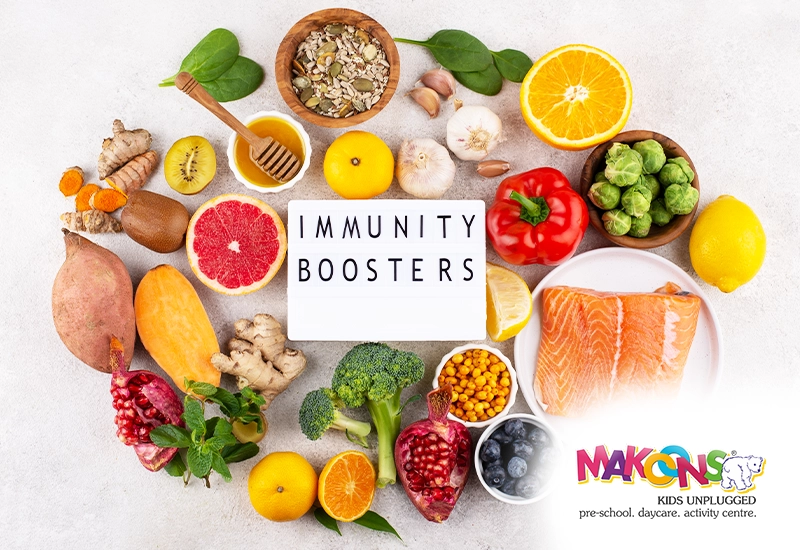Parents always search for strategies to keep their small children robust and healthy. Supporting toddlers’ developing immune systems becomes a key concern because daycares, playgroups, and early childhood activities expose toddlers to a range of pathogens. Although supplements have value, nature offers a wealth of foods high in nutrients that can significantly boost your child’s immune system and Malnutrition in Children. Let’s investigate ten amazing superfoods that naturally strengthen your child’s immunity.
Why Should Children Eat Foods Boosting Their Immune System?
A toddler’s immune system is still developing and depends on an appropriate diet to run at its best. The correct diets supply vital minerals, vitamins, and antioxidants to boost immune cell development and activation. Including these superfoods in your child’s diet can help them create a basis for lifetime health and maybe help to lower those endless rounds of colds and infections.
1. Greek yoghurt: Probiotic Powerhouse
Greek yoghurt’s probiotic makeup makes it among the top superfoods for children’s immune systems. A healthy gut microbiome is maintained in part by these helpful bacteria, which are vital for immune system function.
How to Serve: Present simple Greek yoghurt alongside fresh fruit and honey drizzles for children over 12 months. It can also be used in place of sour cream in dishes and mixed into smoothies.
2. Berries: Leader in Antioxidants
Vitamin C, antioxidants, and other phytonutrients supporting the immune system abound in strawberries, blueberries, and raspberries. These brightly coloured fruits protect cells from damage and combat inflammation.
How to Serve: Present as a finger food snack, make a berry parfait with layers of yoghurt, toss them into muesli or combine them into smoothies.
3. Sweet potatoes: Eroes in vitamin A
Beta-carotene found in sweet potatoes is abundant and changes in the body to become vitamin A. Maintaining the health of mucosal surfaces like those lining the digestive and respiratory tracts—your toddler’s first line of protection against infections—requires vitamin A.
How to Serve: Roast sweet potato cubes with a little cinnamon, mash them with a little butter, or bake sweet potato “fries” in the oven.
4. Eggs: Complete Protein Packaging
Protein, zinc, selenium, vitamins A and D abound in eggs—all components essential for a good newborn diet to strengthen immunity. The yolks especially abound in immune-supporting minerals.
How to Serve: Excellent ways to include eggs in your toddler’s diet are scrambled eggs, little egg muffins filled with vegetables, hard-boiled egg wedges, or French toast.
5. Leafy greens: nutrient-dense
Along with folate and other immune-boosting nutrients, dark leafy greens like kale and spinach abound in vitamins A, C, and E. These foods, high in vitamins for children, offer vital elements for general immune system performance.
How to Serve: For Fun dinners, blend mild greens into smoothies, finely slice them into spaghetti sauces or meatballs, or sauté them with a bit of garlic as a side dish.
6. Oats: Immunity Boosters Rich in Fibre
Beta-glucan, a kind of soluble fibre found in oats, has antioxidant and antibacterial qualities. This supports digestive health and cardiac function as well as helps boost your child’s immune system.
How to Serve: Prepare warm muesli with fruit; make muesli with yoghurt; or use oat flour in pancakes and muffins.
7. Nuts and Seeds: Perfect Fatty Acid Boosters
Appropriate kinds of nuts and seeds for toddlers contain zinc, selenium, vitamin E, and essential fatty acids—all vital components for immunological function. Particularly high in omega-3 fatty acids with anti-inflammatory effects include walnuts, chia seeds, and flaxseeds.
How to Serve: For toddlers, serve nut butters thinly spread on toast, powdered seeds blended with yoghurt or oatmeal or finely chopped nuts in baked goods (should allergies not be a factor).
8. Citrus Fruits: Vitamin C Superstars
Famous for their vitamin C content, which enables white blood cells to be manufactured and active, oranges, clementines, and other citrus fruits are. Children’s natural immunity builders can reduce the duration and severity of colds.
How to Serve: Offer young children little pieces of clementines or oranges, freshly squeezed juice mixed with water, or sprinkle zest over baked products for a taste explosion.
9. Bell Peppers: Bright Immune Garters
Along with vitamin A and other antioxidants supporting immune function, bell peppers—especially the red, yellow, and orange varieties—have more vitamin C than citrus fruits.
How to Serve: Cut into thin pieces for dipping; roast till tender; add to stir-fries; mix into sauces and soups.
10. Fish and Lean Meats: Protein and Zinc Sources
Lean meats like chicken and turkey, together with fish like salmon, provide high-quality protein, zinc, and omega-3 fatty acids—in the case of fatty fish—all vital for immune cell formation and function.
How to Serve: Present small, soft bits of grilled or baked chicken, salmon patties, or use ground meats in meatballs with hidden vegetables.
Tips for Including Immune-Boosting Foods in Your Toddler’s Diet
- Be persistent: It may take ten to fifteen exposures before a toddler takes to a new meal. Do not give up!
- Lead by example: Children are more likely to consume things they see their parents loving.
- Make it enjoyable: To increase curiosity, use colourful plates, use cookie cutters for pleasing forms, or create food faces.
- Involve your young child: Young children are more eager to taste new foods since they may help wash fruits or break lettuce leaves.
Also Read- Tips to Prevent Child From Mobile Phone Addiction
Conclusion–
Although you should concentrate on immune-boosting meals for children, keep in mind that your toddler’s immune system depends critically on healthy sleep habits, frequent physical activity, and low stress levels as well. The best defence against seasonal infections is a complete strategy.
Regularly including these superfoods in your toddler’s diet helps their growing immune system get the nutrients it needs to operate as it should. Though a nutrient-dense diet can help lower their frequency and intensity, keeping your child healthy and vibrant, the occasional cold or virus is normal and even helpful for building immunity. Hence, your efforts to integrate these superfoods into your child’s diet are quite valuable in both the short and long term.


